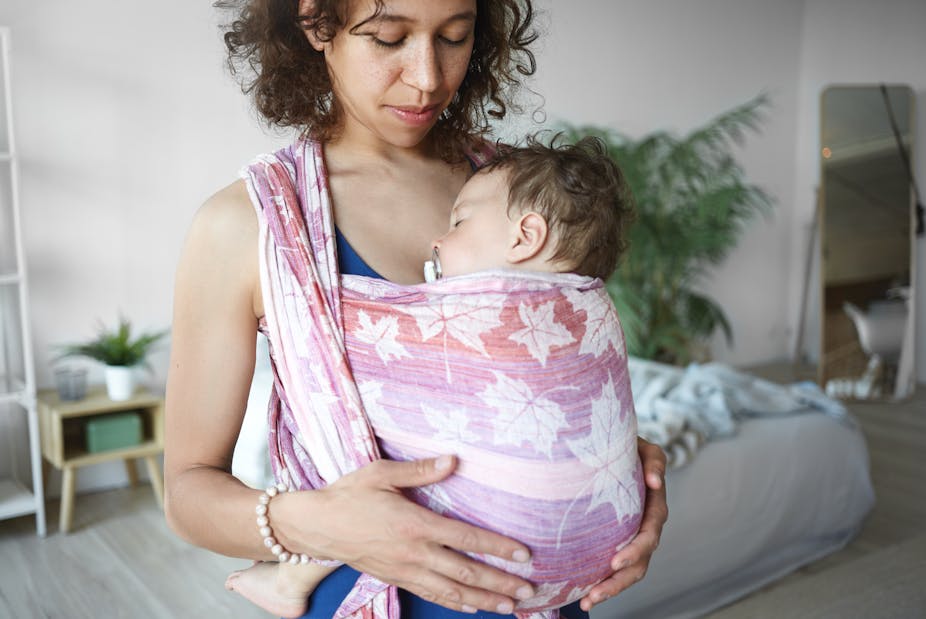Women’s experiences of pregnancy, birth and postnatal care have been significantly affected by the pandemic. One challenge some mothers have faced around the world was being separated from their baby because of COVID-19 hospital policies.
During the peak of the pandemic, some women reported being separated from their infant if either exhibited symptoms of COVID-19. There was also evidence of newborns who were sick or pre-term being separated from their mothers for confirmed or suspected COVID-19 infections. Research from around the world, including the US, Italy and the UK has found that some neonatal intensive care units (NICUs) also severely restricted visiting during the pandemic – even to those without COVID-19.
While some hospitals used video messaging for parents to connect with their baby, this is very poor substitute for being together. Separating mother and baby can have devastating impacts upon a mother’s emotional wellbeing, and can also interrupt bonding and breastfeeding. Research has also shown both mothers and infants experience high stress when separated after birth.
Understandably, we have seen increased rates of postnatal depression, anxiety and stress during the pandemic. Greater numbers of women are also showing signs of birth trauma and post traumatic stress, likely due to altered care practices during birth and after delivery. Data from China also highlights how separation of mother and baby during the pandemic negatively affected maternal-infant bonding.
Breastfeeding has also been affected, with some mothers in the UK stopping early because of the impact of not being able to visit their premature baby in the NICU. Establishing breastfeeding when separated from a baby is extremely challenging, and is associated with stopping breastfeeding for a number of reasons, including that the stress of separation may inhibit how easily milk is released from the breast.
Thankfully, due to falling infection rates, increased knowledge around how COVID-19 impacts infants, and sustained campaigning by organisations such as Birthrights in the UK, restrictions are now easing in some parts of the world. However variations still exist between areas in the UK, with official guidance still preventing mothers with COVID-19 visiting their babies in the NICU. Meanwhile, strict separation regulations remain in countries where cases are increasing, such as India.
But while the situation has largely improved since the height of the pandemic, the repercussions are still being felt. The experience of being separated has been tough for many. Separation can also make it more difficult for mothers to care for their infants when they are reunited. If you were separated from your baby and are struggling to feel a bond with them, there are many things you can do to heal and improve your relationship with your baby.
Skin-to-skin contact
Have as much skin-to-skin contact with your baby as you can.
Skin-to-skin isn’t just for newborns after birth. It can help calm and soothe your baby and help to establish breastfeeding. Research has shown that it can also help mothers connect emotionally with their baby, even after being separated.
Try a bath with your baby, relaxing in bed with them or simply spending time holding them with no clothes in between you.
Baby massage
Another option is to try some baby massage, either at home or at a class when they re-open. Baby massage is the gentle, rhythmic stroking of your baby, often whilst gently talking or singing to them.

Baby massage can help you to recognise and understand your baby’s cues of whether they’re enjoying it and what helps soothe them most – and will increase feelings of connection to your baby. The hormone oxytocin is also released in you and your baby, which helps you both feel calmer and more relaxed.
Keep your baby close
Another way to regain connection with your baby is to keep them physically close as much as possible.
One easy way to do this is to carry them in a soft sling. The movement, the warmth of your body, and being close to your heart (which recreates a feeling of being back in the womb) soothes your baby.
Babies who are carried regularly cry less on average. Carrying also helps with bonding and can reduce symptoms of postnatal depression.
Breastfeeding and nurturing feeding
Continuing to breastfeed can help you bond with your baby. If you stopped breastfeeding before you were ready to do so, know that it’s possible to restart breastfeeding at any time in a process called “relactation”. Some women have chosen to start breastfeeding again during the pandemic, due to mothers wanting to give their baby the possible protection of COVID-19 antibodies through their milk from maternal infection or vaccination. A breastfeeding counsellor or lactation consultant can help you to work out if that’s something you want to do, and how to do it. You can contact free helplines for support with relactation or any breastfeeding difficulties you are having.
If you are bottle feeding, try holding your baby close while you feed them, giving them loving eye contact will help you both to bond. Even if your baby is older and eating solid foods, eye contact while feeding is a powerful connecting tool.
If you were separated from your baby at any point during the pandemic and are struggling, don’t be afraid to reach out and talk to others about how you feel. This might be a trusted friend, a health professional, a therapist, or counsellor. If you are struggling with the memories, are feeling anxious or depressed, or experiencing feelings of grief and loss, know that these are all valid emotions. Talking and working through these, whichever way works best for you, can help you process the experience and help strengthen the bond with your baby.
Finally, be kind to yourself and your baby - and remember you have plenty of time to bond with them, and that your relationship will grow and develop as your baby does.

